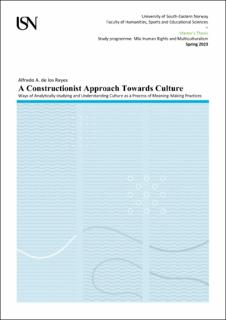| dc.description.abstract | Culture is said to be one of the most perplexing concepts in human and social sciences to understand and define. In more traditional conceptualizations, culture is held as a complex whole depicting the totality of a “communities way of life.” However, when considering the post-immigration world of pluralistic societies, the conventional conceptualization of culture becomes problematic. Further problematizing this conceptualization is the absence of human agency, where people are treated as dopes under the deterministic forces of culture. Addressing these issues, the main objective of this thesis is two-fold. First, the overall objective is to analytically conceptualize how to study and examine what culture is and how it comes about, making this thesis primarily theoretical in nature. Accordingly, this thesis offers nuanced ways of conceptualizing culture as a dynamic process consisting of an arrangement of social practices in which meanings are constructed and exchanged. It provides a framework for understanding and analyzing the construction of culture and offers a method for conducting empirical research that is both theoretically sound and methodologically rigorous. Second, in not divorcing my thesis from the empirical, I seek to exemplify the above conceptualization of culture through empirical evidence, implementing the contended for analytical framework and methodology. In doing research, a constructionist ethnographic approach examines the socially situated interactions of people from diverse backgrounds in a Language Café. The data demonstrates that although culture is a social process of interpretive, meaning-making practices it is experienced and conveyed by the participants as something real that exist apart from their interpretations of it. In this sense, culture is a socially constructed social entity, an arrangement of social conventions, agreements, understandings, and meanings seen in the conceptual maps of typification schemes, collective memories, social representations, common-sense knowledge, and taken-for-granted actions. I contend that as a social entity, culture does not exist apart from those who grant it its ontological status; however, it is not reducible to those individuals. In this sense, culture is a co-constitution of agents and structures. Ultimately, this thesis contributes to the ongoing dialogue about the nature of culture and how it is constructed and offers insights that can be applied to a wide range of fields, including anthropology, sociology, and cultural studies.
Keywords: social constructionism, culture, ethnomethodology, conversation analysis, Foucault, and social interaction. | |
